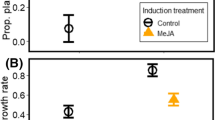Abstract.
Herbivory induces both direct and indirect defenses in plants; however, some combinations of these defenses may not be compatible. The jasmonate signal cascade activated both direct (nicotine accumulations) and indirect (mono- and sesquiterpene emissions) whole-plant defense responses in the native tobacco Nicotiana attenuata Torr. Ex Wats. Nicotine accumulations were proportional to the amount of leaf wounding and the resulting increases in jasmonic acid (JA) concentrations. However, when larvae of the nicotine-tolerant herbivore, Manduca sexta, fed on plants or their oral secretions were applied to leaf punctures, the normal wound response was dramatically altered, as evidenced by large (4- to 10-fold) increases in the release of (i) volatile terpenoids and (ii) ethylene, (iii) increased (4- to 30-fold) accumulations of endogenous JA pools, but (iv) decreased or unchanged nicotine accumulations. The ethylene release, which was insensitive to inhibitors of induced JA accumulation, was sufficient to account for the attenuated nicotine response. Applications of ethylene and ethephon suppressed the induced nicotine response and pre-treatment of plants with a competitive inhibitor of ethylene receptors, 1-methylcyclopropene, restored the full nicotine response. This ethylene burst, however, did not inhibit the release of volatile terpenoids. Because parasitoids of Manduca larvae are sensitive to the dietary intake of nicotine by their hosts, this ethylene-mediated switching from direct to a putative indirect defense may represent an adaptive tailoring of a plant's defense response.
Similar content being viewed by others
Author information
Authors and Affiliations
Additional information
Received: 13 June 1999 / Accepted: 21 August 1999
Rights and permissions
About this article
Cite this article
Kahl, J., Siemens, D., Aerts, R. et al. Herbivore-induced ethylene suppresses a direct defense but not a putative indirect defense against an adapted herbivore. Planta 210, 336–342 (2000). https://doi.org/10.1007/PL00008142
Issue Date:
DOI: https://doi.org/10.1007/PL00008142




